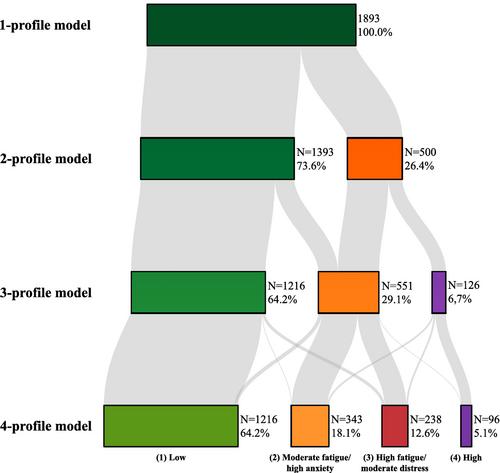Profiles of Fatigue and Psychological Symptoms in Long-Term Childhood, Adolescent, and Young Adult Cancer Survivors—The NOR-CAYACS Study
Abstract
Introduction
Long-term childhood, adolescent, and young adult cancer survivors (CAYACS) are at risk of fatigue and psychological problems. However, their interactions remain largely unexplored. Understanding how they cluster can inform treatment and person-centered follow-up care. We aimed to identify and describe profiles of co-occurring fatigue and psychological symptoms and investigate their associations with health-related quality of life (HRQOL) in CAYACS.
Methods
NOR-CAYACS (The Norwegian Childhood, Adolescents and Young Adult Cancer Survivors study) was a nationwide survey involving adult survivors of any childhood cancer (aged < 19 years at diagnosis) and selected young adult cancers (breast and colorectal cancers, non-Hodgkin lymphoma, leukemias, and malignant melanomas, aged 19–39 years at diagnosis) identified through the Cancer Registry of Norway. We included 1893 survivors aged ≥ 18 years, ≥ 5 years since diagnosis. We performed latent profile analysis with six continuous outcomes: physical and mental fatigue, depression, anxiety, post-traumatic stress symptoms, and fear of recurrence.
Results
We identified an overall “Low” (64%), a “Moderate fatigue/high anxiety” (18%), a “High fatigue/moderate distress” (13%), and an overall “High” (5%) symptom burden profile. The “High” profile exhibited lowest physical- and mental-HRQOL with T-scores −9.8 (95% confidence interval [95% CI]: −12.5, −7.1) and −25.0 (95% CI: −26.7, −23.3) compared to the “Low” profile.
Conclusion
We identified four profiles, two characterized by high fatigue and two near normative fatigue levels, each with different psychological symptom burden. Greater symptom burden corresponded to lower HRQOL, with high fatigue profiles showing lower physical HRQOL. These profiles help identify at-risk individuals and allow for targeting interventions and follow-up care to survivors' unique constellation of symptoms.


 求助内容:
求助内容: 应助结果提醒方式:
应助结果提醒方式:


